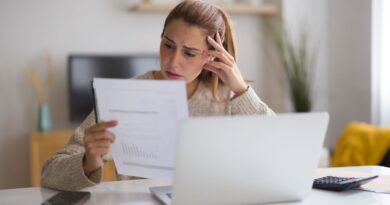Rachel Reeves to blame for inflation surge now she faces bigger shock | Personal Finance | Finance
Consumer price inflation jumped to 3.5% in April, plunging all of us back into the cost-of-living crisis.
Inflation stood at 3% in January, then slipped to 2.8% in February and declined again in March to 2.6%.
So today’s print is a massive jump – and bigger than the 3.3% figure expected.
Part of this is down to “awful April”, the annual phenomenon where a string of household bills increases.
We can’t really blame Reeves for the 6.4% jump in the Ofgem energy cap (although we can blame Labour cabinet colleague Ed Miliband).
Large hikes to water bills, council tax, broadband, mobile tariffs and TV licences aren’t really her fault either.
But April’s spike was largely fuelled by the Chancellor’s autumn Budget tax raid, most notably the rise in employer’s National Insurance contributions.
This will cost businesses £25billion, and most will pass on the much of the cost to customers, by hiking prices.
The Chancellor’s decision to hike the national minimum wage by an inflation-busting 6.7% drove up inflation for the same reason.
Both came into force in April. Hence today’s nightmare. There are more sleepless nights to come.
The Bank of England previously warned that inflation would hit 3.5% later in the summer. Reeves has brought that forward.
It’s a disaster for pensioners living on fixed incomes. Many top up their state pensions using the interest on their savings accounts, but their cash deposits are being eaten away by inflation.
Even relatively modest inflation can reduce the purchasing power of savers’ deposits.
At 3.5% a year, it reduces £10,000 by a hefty £350 in just 12 months. Savers must shop around for the best possible interest rate to counteract that.
Naturally, it’s bad news for mortgage borrowers too, because the Bank of England will now be reluctant to cut interest rates below today’s 4.25%.
Now for the really worrying part.
Reeves had an unexpected piece of good economic news recently, pretty much the first I can remember since she took over as Chancellor last July.
The economy grew by 0.7% in the first three months of the year, a solid jump after stagnating for the first six months on her watch.
But there’s a catch.
Although Reeves took the credit for it, the increase wasn’t really down to her, but a weird one-off factor.
The GDP hop was fuelled by companies racing to ship goods to the US before President Donald Trump’s “liberation day” tariffs announcement on April 2.
That made our economy look stronger than it was, and it’s about to go into reverse.
US companies have stocked up, so demand may fall.
And although we have some kind of trade deal, courtesy of Keir Starmer, UK goods will still carry a minimum 10% tariff that they didn’t incur before.
That will hit subsequent sales – and that GDP growth number.
In fact, we may get no growth at all in the second quarter.
It’s the ultimate nightmare for Rachel Reeves – but my sympathies lie elsewhere.





